Kirk Fletcher: "Seeing Robben Ford was the thing to make me go, 'Okay, I wanna play for real…'"
One of blues guitar's hottest players on his journey so far
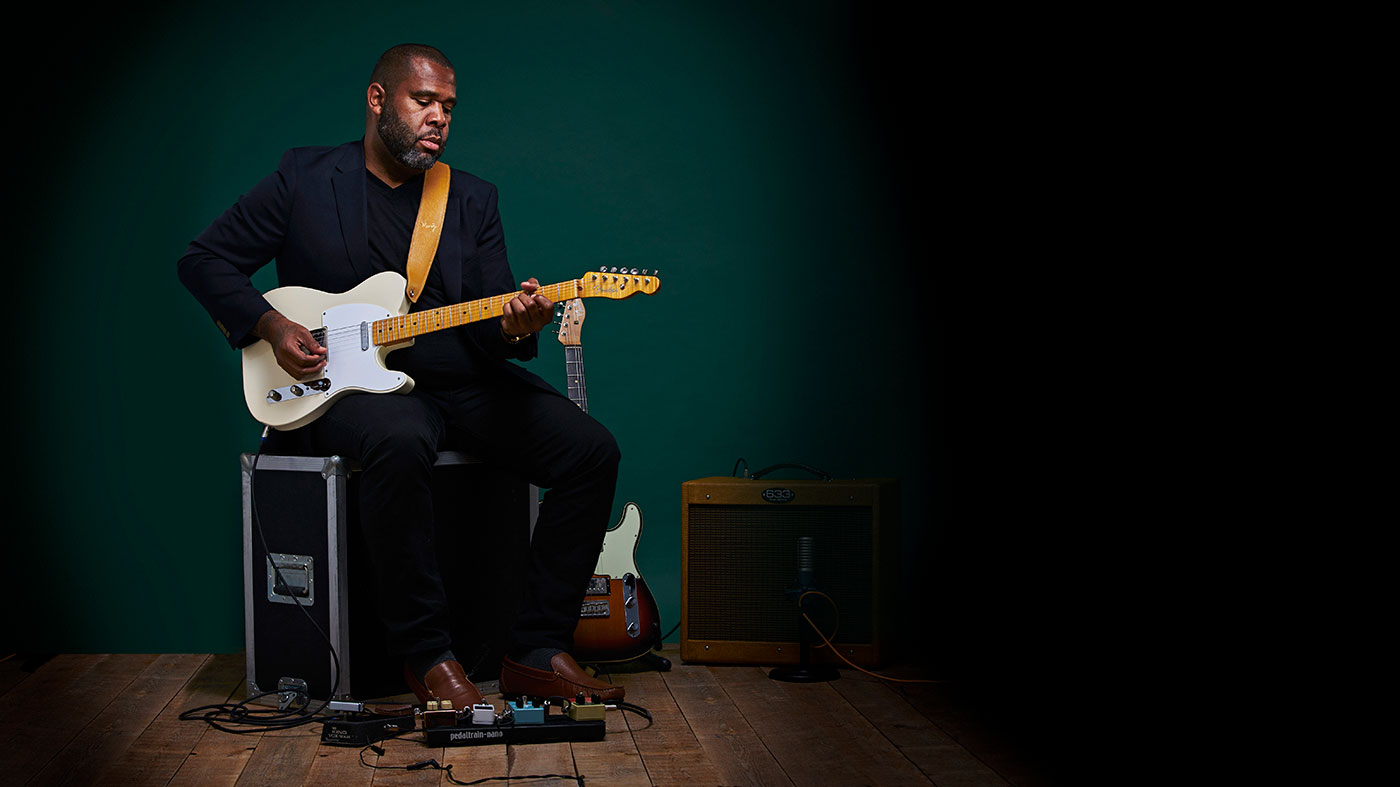
Want all the hottest music and gear news, reviews, deals, features and more, direct to your inbox? Sign up here.
You are now subscribed
Your newsletter sign-up was successful
This autumn saw the arrival of bluesman Kirk Fletcher’s new album, Hold On, and while he was over in the UK for some dates, he stopped by the studios to talk and also delivered a soul-shaking blues lesson.
Before the cameras started rolling for our video tutorial, we settled back to talk about Kirk Fletcher’s latest release, Hold On. We started by asking him to explain the basics: “Hold On means something to everybody,” he says. “It can mean holding on waiting on the train to get there, waiting on your child to be born, whatever, you know?”
Five or six hours would go by after school and I’m still playing
Recorded in Bristol back in January of this year, the album features Matt Brown on drums and Jonny Henderson on organ and piano. “You’ve probably heard Jonny Henderson with Matt Scofield,” Kirk continues.
“He’s a bass player and an organ player, but he just plays the organ - he actually plays bass on the Hammond B3 and it’s fantastic, y’know? The funny thing is that most people that have heard the record are like, ‘There’s no bass?’ It is bass, it’s just Hammond bass!”
The album offers a great mix of soul, gospel and 60s-style R&B, with Kirk’s smooth baritone a perfect foil for his singing guitar lines. We wondered where his style originated.
“The first inspiration was my older brother in my father’s church,” he tells us. “That’s where it really started, just gospel music - and now I feel that the older I get, that’s coming out again. I went through all these different musical things and now it seems to be coming out more.”
Besides the gospel sounds, who were your other early influences?
Want all the hottest music and gear news, reviews, deals, features and more, direct to your inbox? Sign up here.
“Oh, man… Some of the main players were Howard Carroll from The Dixie Hummingbirds, a fantastic guitar player. Another guitar player they call ‘Spanky’, his name was Eddie Alford, he played with The Mighty Clouds Of Joy - those were some of the fundamental guys. Then you had BB King, obviously, Albert King, Stevie Ray Vaughan - early influences - and also Prince, Eddie Van Halen and all those guys, too, because I’m 42, a child of the 80s.”
How old were you when you started playing?
“I started when I was about eight years old in my dad’s church. I just picked it up from my brother; he played guitar and it was the classic story. I didn’t even really think about it: one minute I couldn’t play and I just loved it, and the next minute I could kinda play a little something - bend a note or play a little Jimmy Reed thing or some simple church song, something like that, y’know. I was like, ‘Hey, wait a minute, I’m starting to learn how to play…’
“I just kept going on from there - five or six hours would go by after school and I’m still playing. I’d wake up in the morning, look at my guitar first thing, it would be propped up against the chair… and my whole life has been pretty much that.”
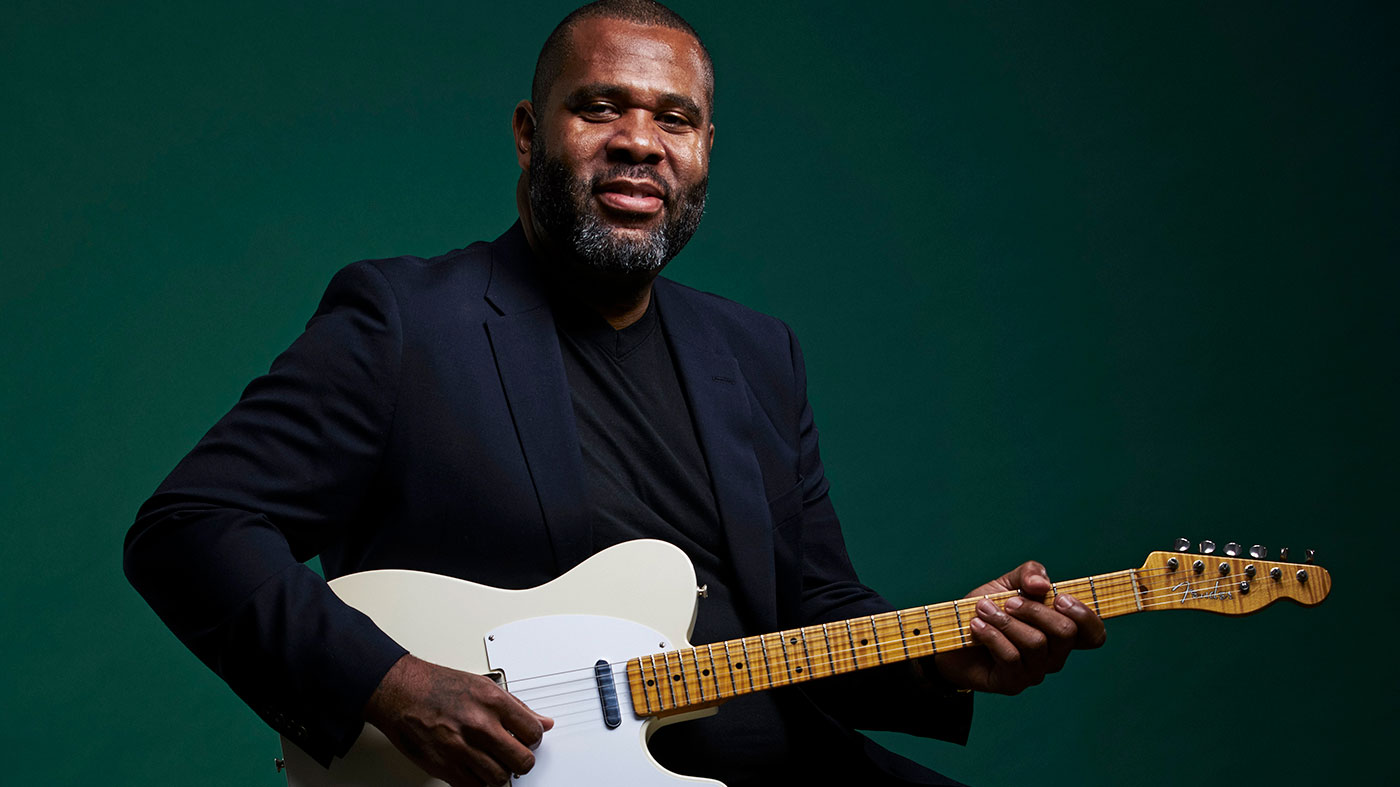
Going pro
When did you start getting into bands?
“Well, the thing about church is that you’re playing in front of people immediately. The kind of church that my dad was a pastor of was Pentecostal, so it’s like whatever you’ve got - snare drum, tambourine, a guitar, a bass with a couple of strings - whatever you’ve got to make music, just do it, just play it. Nobody judges you and you just go for it.
“But the band thing happened when I was about 15 or 16. I started playing in R&B bands and little Top 40 bands with my brother and different musicians I went to school with and members of the church that had other family members that played and had R&B bands and stuff. I guess my first real legit band was probably Brent Jones & The TP Mobb, like a hip-hop gospel choir. We played real funky, contemporary gospel stuff.”
What instruments did you start out with?
To this day I still really remember [Robben's] sound. And it was a very special time for him
“Squier Stratocasters. Just the old Japanese Squiers and a lot of solid-state amps, like the Randall RG80 - I had that for a long time - a Roland Jazz Chorus, Peavey amplifiers - a lot of that stuff. So from the beginning it was trying to get the biggest, cleanest tone.”
When did you decide to go into music professionally? Was there a watershed moment for you?
“Deciding to go professional happened at a music store that I went to when I was about 17 or 18. My brother took me to this music store called Music Works and there I met Robben Ford’s tech and he started bringing me along, y’know, to help with gear, stuff like that. Seeing those guys - Robben Ford & The Blue Line at that time, at about ’94 or ’95 - was what did it. That was the thing to make me go, ‘Okay, I wanna play for real…’ I’d be riding with my buddy Jeff, who was his tech at that time, and he’d take him to the airport or something, or pick up gear for studio sessions and stuff and I’m like, ‘Oh, man! You can actually do this for a living?’”
Was it a bit like having a guitar lesson from Robben every night?
“To this day, I still really remember his sound. And it was a very special time for him because he had all this back history of Joni Mitchell, Miles Davis - he was about the same age as I am now. So he’s writing songs and playing with his band and they were just incredible, y’know? So the timing couldn’t have been better. I would ask Robben, ‘So, what Miles Davis record should I buy?’ Because, of course, he has listened to Miles Davis ever since he was a kid, so who better to ask?”
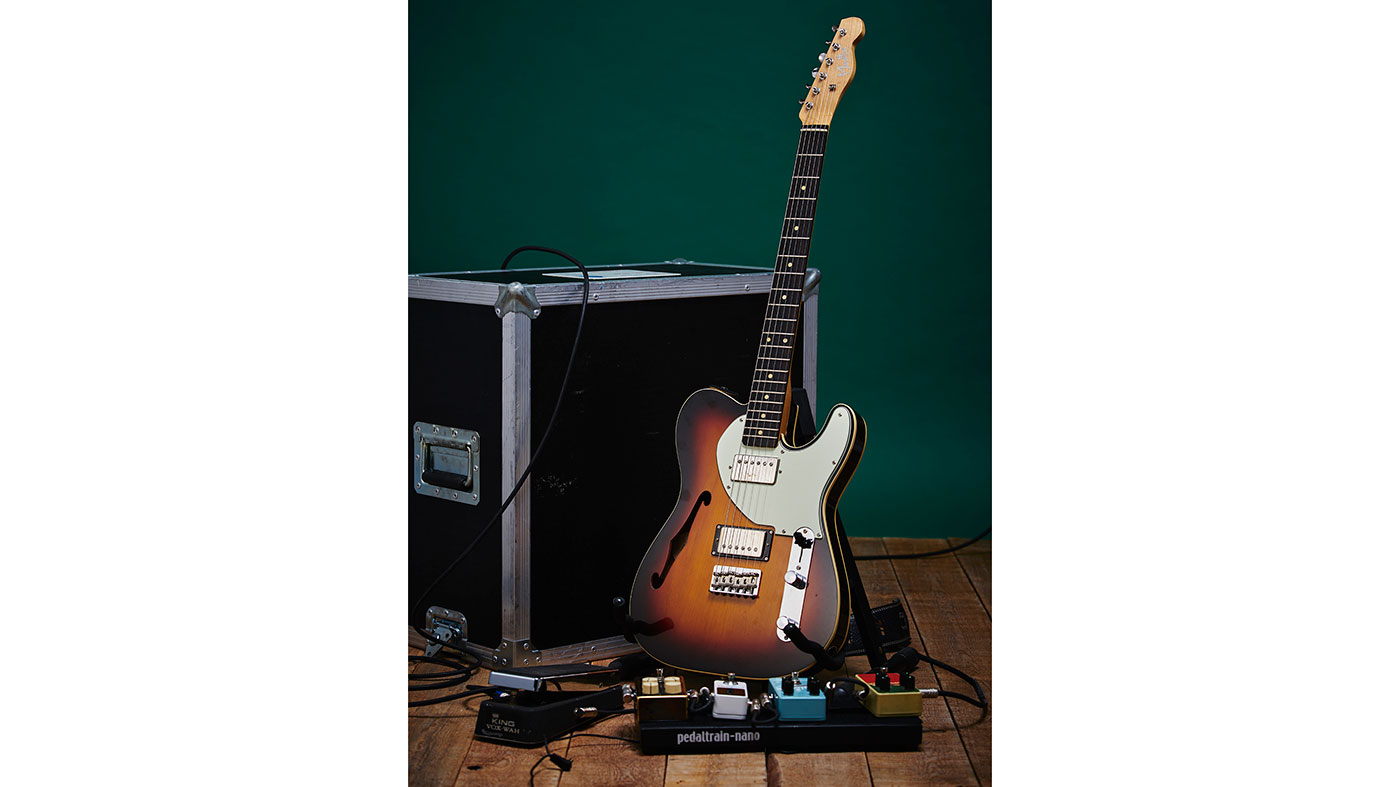
Semi-hollow Moollon T-Style
A dual-humbucker semi-hollow Moollon T-Style guitar took care of all the Les Paul and 335 tones on the new album, Hold On
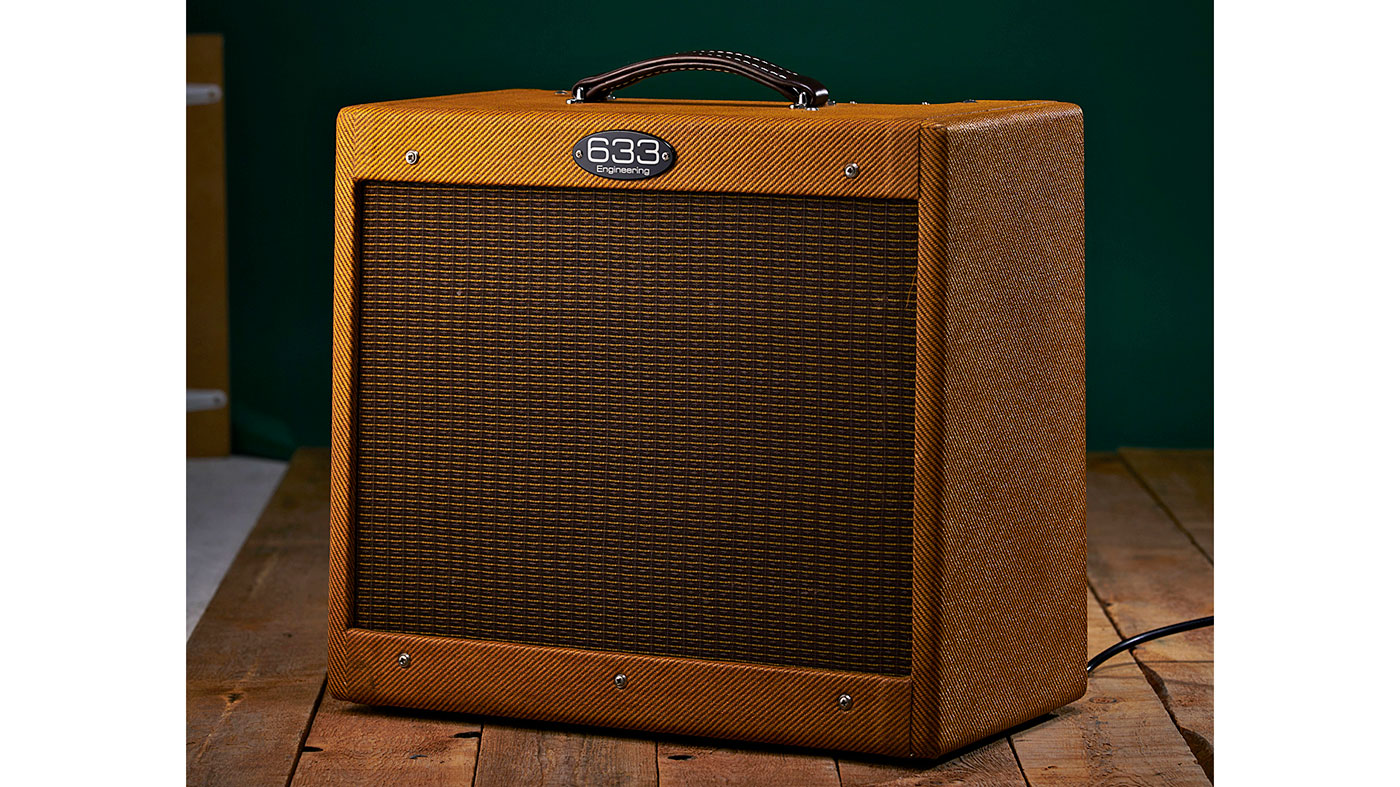
633 Engineering amp
Kirk’s current touring and studio amp is from Cliff Brown at 633 Engineering: “Basically a Tweed Bassman style thing with two 12-inch Vox Gold speakers…”
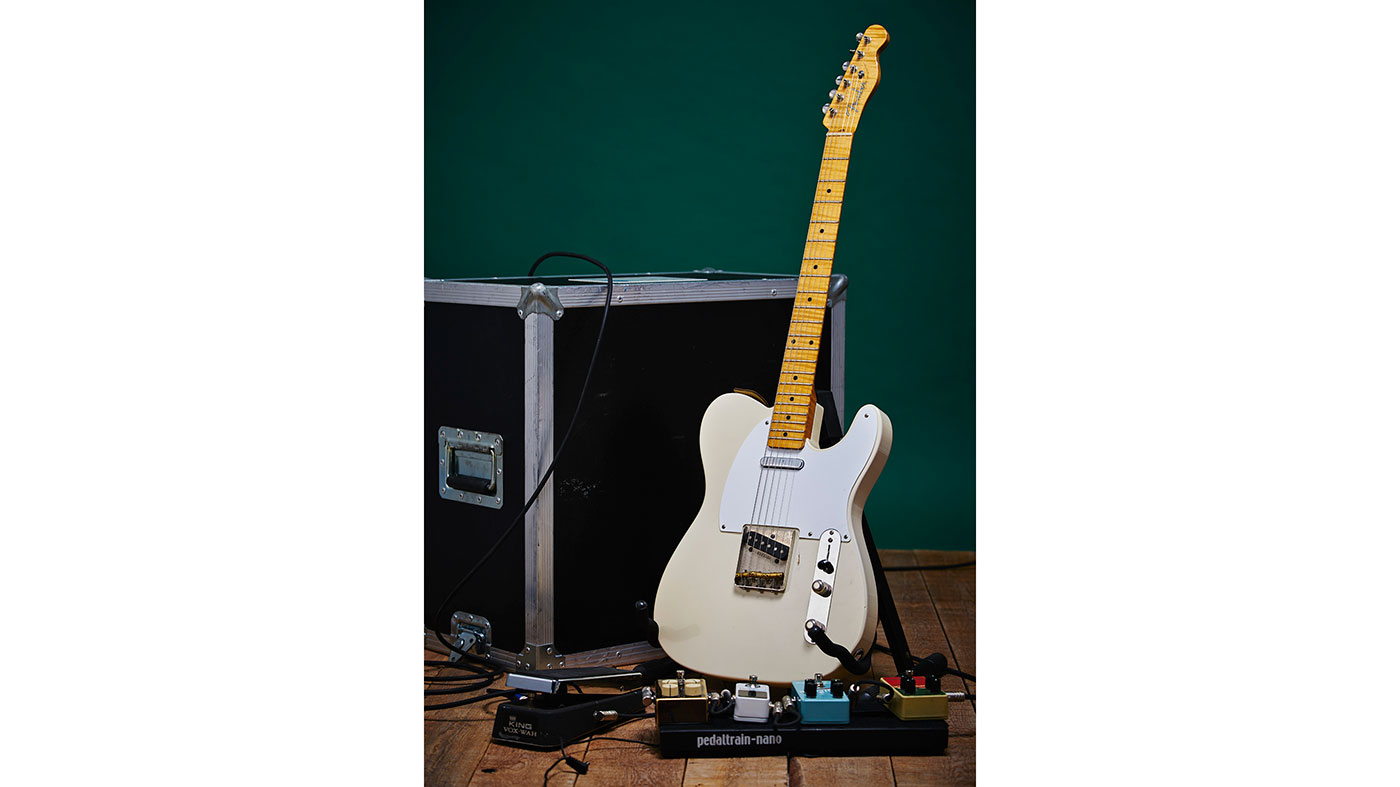
'Sofia' Tele
Nicknamed ‘Sofia’, Kirk acquired this Tele from pickup maker Ron Ellis
Smiles for miles
Which of Miles’s albums did he recommend?
“Kind Of Blue and then you go to Miles Smiles, Four And More, My Funny Valentine… However, I went backwards. I got all the Steamin’, Relaxing With… or whatever. I can’t play jazz. I have friends that can really play jazz, so it’s kinda like, ‘No!’ But just having that phrasing of saxophone or organ players… it’s a different approach to my blues playing and that’s what I got from that. More so than harmonically playing through all these changes, or whatever.”
Many people will have discovered your playing via the YouTube videos of you jamming with Josh Smith and Joe Bonamassa…
I was playing at Harvelle’s, this little club in Santa Monica, California, and he came out and sat in
“My buddies! Those guys are crazy guitar players. I did play a lot as a kid and everything, but these guys… y’know, hard work really does pay off. When you listen to those guys, I’m inspired because those guys are guitar players’ guitar players and I’m sort of like the record collector guy - the guy you’d see in the record store and I don’t maybe take it as serious as those guys, in a way. With all the love in the world - those guys are like my family - but I come from a different place. So it’s fascinating to see those guys. And Eric Gales: he’s a nice guy, too.”
How did you meet Joe?
“I actually met Joe years and years ago in Belgium for a couple of minutes. He was just backstage at this festival and I just walked over, because I’d seen him in magazines. So I was like, ‘Hey, how you doing?’ Then I think we exchanged numbers and just stayed in touch.
“Then I was playing at Harvelle’s, this little club in Santa Monica, California, and he came out and sat in. It was amazing, off the cuff. I gave him my guitar to play and he gave me my guitar back and we exchanged guitars back and forth and it was so amazing and so moving. I think that’s what really solidified the deal for us being buddies.”
Star turn
And you recently toured with Joe…
“Yeah, and it’s funny because does Joe really need a rhythm guitar player? He says it was fun to have me, but I know that Joe really did that to help me, too. To bring me on a bigger stage so I could play and be a part of that. Joe’s like that; he’s just a good dude.”
Another case of having a guitar lesson every night?
My guitar is always evolving. I play a Gibson Les Paul, Collector’s Choice, I have a ’64 Strat that I love, and I also have this Telecaster named Sofia
“Well, yeah. It was not only a guitar lesson, but it was also a life lesson. A lot of people see Joe and they go, ‘Oh, he’s successful and everything…’ but that guy works his ass off. His work ethic and what he puts into it - I’ve found only a few people who would be willing to do all that. So he deserves everything.”
What gear will you be taking out with you when you tour the new album?
“I’m playing a 633 amplifier made by Cliff Brown and it’s fantastic. It’s like basically a Tweed Bassman style thing with two 12-inch Vox Gold speakers, but Cliff made it really efficient. It’s got a solid-state rectifier and it’s loud; it’s so loud and fat and warm and it just sounds amazing. So I’m using that for my main amp.
“My guitar is always evolving. I play a Gibson Les Paul, Collector’s Choice, I have a ’64 Strat that I love, and I also have this Telecaster named Sofia - I love that guitar. I just got my ’66 335 back that I sold to a friend and I’m really excited about bringing that out at my UK shows next year. I’ve got two Tyler Strats that I love - I mean, just for grabbing a guitar that’s fat, plays in tune, my Tyler guitars are fantastic. I’ve got a Taylor and a Moollon Tele that I used on the record.”
Will you be touring in the UK?
“I’ll do some touring in the UK and everywhere, just promoting the new record. I’m really excited about that and playing with the same band all the time.”
Kirk Fletcher’s new album, Hold On, is available now on Elaysia Records.

